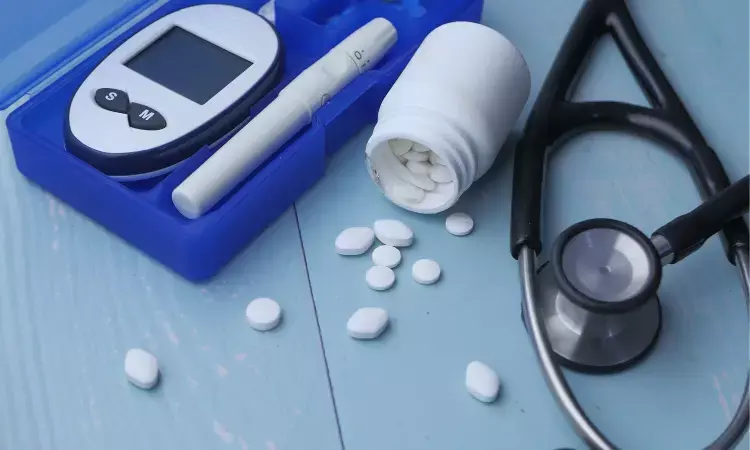- Home
- Medical news & Guidelines
- Anesthesiology
- Cardiology and CTVS
- Critical Care
- Dentistry
- Dermatology
- Diabetes and Endocrinology
- ENT
- Gastroenterology
- Medicine
- Nephrology
- Neurology
- Obstretics-Gynaecology
- Oncology
- Ophthalmology
- Orthopaedics
- Pediatrics-Neonatology
- Psychiatry
- Pulmonology
- Radiology
- Surgery
- Urology
- Laboratory Medicine
- Diet
- Nursing
- Paramedical
- Physiotherapy
- Health news
- Fact Check
- Bone Health Fact Check
- Brain Health Fact Check
- Cancer Related Fact Check
- Child Care Fact Check
- Dental and oral health fact check
- Diabetes and metabolic health fact check
- Diet and Nutrition Fact Check
- Eye and ENT Care Fact Check
- Fitness fact check
- Gut health fact check
- Heart health fact check
- Kidney health fact check
- Medical education fact check
- Men's health fact check
- Respiratory fact check
- Skin and hair care fact check
- Vaccine and Immunization fact check
- Women's health fact check
- AYUSH
- State News
- Andaman and Nicobar Islands
- Andhra Pradesh
- Arunachal Pradesh
- Assam
- Bihar
- Chandigarh
- Chattisgarh
- Dadra and Nagar Haveli
- Daman and Diu
- Delhi
- Goa
- Gujarat
- Haryana
- Himachal Pradesh
- Jammu & Kashmir
- Jharkhand
- Karnataka
- Kerala
- Ladakh
- Lakshadweep
- Madhya Pradesh
- Maharashtra
- Manipur
- Meghalaya
- Mizoram
- Nagaland
- Odisha
- Puducherry
- Punjab
- Rajasthan
- Sikkim
- Tamil Nadu
- Telangana
- Tripura
- Uttar Pradesh
- Uttrakhand
- West Bengal
- Medical Education
- Industry
Tirzepatide Slows CKD Progression among diabetes patients with Increased CV risk

Tirzepatide can slow progression of chronic kidney disease in type 2 diabetes according to an analysis of SURPASS-4 data presented at ADA 2022.
In the phase 3 trial, the apparent reduction in progression of chronic kidney disease observed with use of tirzepatide was 41% reduction in progression of CKD in T2D compared to insulin glargine.
A pre-specified exploratory analysis from the SURPASS-4 trial showed tirzepatide, a novel once-weekly medication for the treatment of diabetes, improved kidney outcomes for adults with type 2 diabetes who have increased cardiovascular risk. SURPASS-4 was part of the SURPASS global clinical development program for Eli Lilly and Company's tirzepatide. Findings were presented at the 82nd Scientific Sessions of the American Diabetes Association® (ADA).
Chronic kidney disease (CKD) is a common complication of type 2 diabetes, a condition that worsens over time and can cause the kidneys to fail. With one in three adults with diabetes impacted by CKD, there is an unmet need for new therapies to reduce the development and progression of CKD in patients with diabetes.
This pre-specific exploratory analysis of SURPASS-4 evaluated the progression to pre-specified kidney endpoints between tirzepatide and titrated daily insulin glargine (iGlar). The rate of decline in kidney function and urinary albumin excretion were used as outcomes.
The clinical endpoint was a decline of 40% or more from baseline, renal death, progression to end-stage renal disease analyzed with and without new onset macroalbuminuria as additional component. A total of 1,995 patients were enrolled, with a mean age of 63.6 years and blood glucose (blood sugar) level, or A1C, of 8.5%. Patients were followed up to 104 weeks.
The results show tirzepatide participants experienced fewer renal complications, compared to those that received insulin. In particular, the rates of new onset of macroalbuminuria, a signal of poor renal outcomes, were significantly lower in the tirzepatide arm (Hazard Ratio = 0.41). Additionally, in individuals with type 2 diabetes and high cardiovascular risk, tirzepatide reduced the rate of kidney function loss and the amount of urinary protein excretion, a risk marker for progression of CKD.
"With these exploratory findings of SURPASS-4, we are seeing the results of combined GIP/GLP-1 receptor agonists on the kidney function of patients with type 2 diabetes for the very first time," said H.J. L. Heerspink, PhD, PharmD, University Medical Center Groningen, Netherlands. "The findings will be of interest to physicians treating people with diabetes who may have chronic kidney disease"
Tirzepatide is a novel, once-weekly injectable glucose-dependent insulinotropic polypeptide (GIP) and glucagon-like peptide-1 (GLP-1) receptor agonist that integrates the actions of the GIP and GLP-1 incretins into a single molecule, representing a new class of medicines for the treatment of type 2 diabetes. In the U.S., tirzepatide is indicated as an adjunct to diet and exercise to improve glycemic control in adults with type 2 diabetes.
Dr Kamal Kant Kohli-MBBS, DTCD- a chest specialist with more than 30 years of practice and a flair for writing clinical articles, Dr Kamal Kant Kohli joined Medical Dialogues as a Chief Editor of Medical News. Besides writing articles, as an editor, he proofreads and verifies all the medical content published on Medical Dialogues including those coming from journals, studies,medical conferences,guidelines etc. Email: drkohli@medicaldialogues.in. Contact no. 011-43720751


